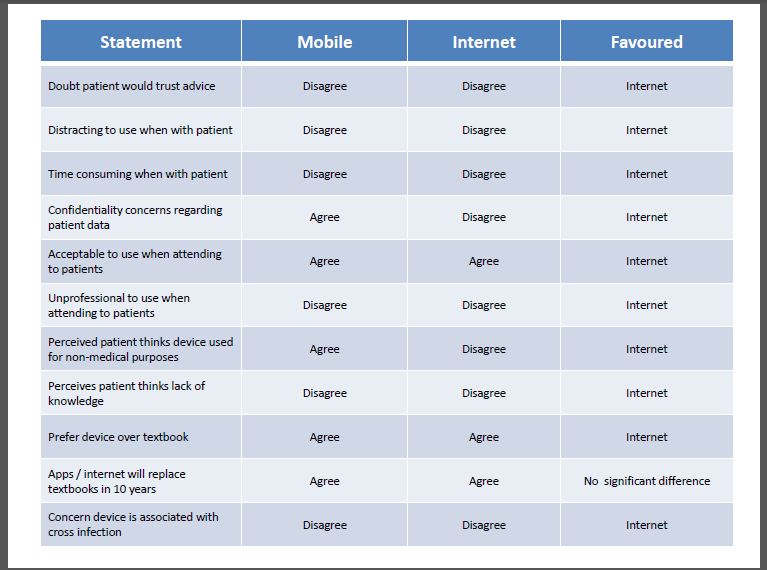



Theme
eLearning
INSTITUTION
Monash University
The Alfred
Deakin University
- More than 10,000 apps within the Apple App Store’s “medical, health care & fitness” category1
- Numerous apps have been designed specifically for healthcare professionals
- Aim of medical apps is to assist in providing adequate patient care
- Concerns have been raised in regards to:
- Risk of pathogen transfer2
- Security of patient information if mobile is lost or stolen3
- Breach in confidentiality2
Aims:
- Enumerate the number of healthcare professionals that use mobile phones in clinical practice
- Determine healthcare professionals’ attitudes towards using mobiles and the internet
• Anonymous online survey in 2012
• Recruited amongst Monash staff and 71 healthcare facilities in Australia
Participation criteria:
• Healthcare qualification
• Practiced in last 2 years
• 43 healthcare professionals
• average of 16.8 years in clinical practice (n = 43, SD = 9.9, range = 2-40)

Figure 1. Healthcare professionals’ mobile phone ownership and use during clinical practice.
Table 1. Healthcare professionals’ attitudes towards the use of mobile phones and the internet in clinical practice. All statements were rated more favourably for the internet than mobiles with the exception of the statements on replacing textbooks within the next 10 years were there was no significant difference.

- 91% have a mobile
- 87% of those that have a mobile used it in clinical practice
- 81% of those that have a private mobile use it in clinical practice
- 0% of clinic-owned mobiles are smartphones
Healthcare professionals had positive attitudes towards mobiles and the internet except mobiles were perceived negatively in regards to:
1) Confidentiality in recording patient information
2) Perception that patients may think that mobiles are used for non-medical purposes
Limitations
- Small sample possibly due to healthcare professionals being time poor and over surveyed.
- Survey restricted to mobiles and internet (e.g., did not ask in regards to tablet use)
- Survey completed online – therefore likely to have favourable attitude towards the internet
The use of mobile phones, especially smartphones, in clinical practice is likely to increase in the future.
Dr Nicole Koehler was employed within the Faculty of Medicine, Nursing and Health Sciences at Monash University at the time this study was conducted.
1. Havelka, S. (2011). Mobile resources for nursing students and nursing faculty. Journal of Electronic Resources in Medical Libraries, 8, 194-199.
2. Phillippi, J. C., & Wyatt, T. H. (2011). Smartphones in nursing education. Computers, Informatics, Nursing, 29, 449-454.
3. Boulos, M. N. K., Wheeler, S., Tavares, C., & Jones, R. (2011). How smartphones are changing the face of mobile and participatory healthcare: An overview, with example from eCAALYX. Biomedical Engineering Online, 10, 24.
 Send Email
Send Email